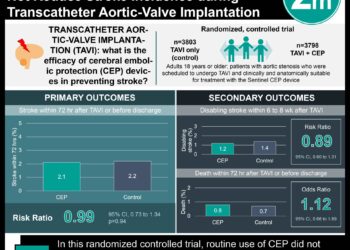Percutaneous coronary intervention associated with decreased stable angina symptoms
1. In this randomized controlled trial, percutaneous coronary intervention (PCI) resulted in decreased symptoms compared to a placebo procedure in patients with stable angina.
2. The incidence of serious adverse events was comparable for both groups.
Evidence Rating Level: 1 (Excellent)
Study Rundown: Angina is often one of the first discernible symptoms of underlying coronary artery disease. Stable angina is characterized by chest discomfort that is triggered by stress or exertion and relieved by rest or with nitroglycerin. PCI is often used as a therapeutic measure for symptoms of stable angina and is supported by evidence from unblinded clinical trials. A previous placebo-controlled trial of PCI with mandated use of guideline-directed antianginal medications illustrated no significant effect of PCI on treadmill exercise time, possibly due to the confounding effect of the antianginal medications. This study investigated the effect of PCI in patients with stable angina who were not receiving antianginal medications. Overall, it showed that PCI resulted in a lower angina symptom score compared to a placebo procedure at 12 weeks, characterized by lower daily angina frequency and lower daily use of antianginal medications. The incidence of serious adverse events, including unblinding due to unacceptable angina and acute coronary syndrome (ACS), was similar in both groups. The trial was limited by a short follow-up period of 12 weeks and a design requiring the cessation of antianginal medications which was against guideline recommendations, although this allowed for the investigation of PCI as monotherapy.
Click here to read the study in NEJM
In-Depth [randomized controlled trial]: ORBITA-2 (Objective Randomized Blinded Investigation with Optimal Medical Therapy of Angioplasty in Stable Angina) investigated the effect of PCI in patients with stable angina. Patients were eligible if they had anatomical evidence of severe coronary disease in at least one vessel and had evidence of ischemia in at least one cardiac territory. Enrolled patients had their antianginal medications discontinued and were monitored during a two-week symptom assessment phase and proceeded to randomization if they reported at least one episode of angina during this period. Such patients were randomly assigned in a 1:1 ratio to undergo PCI with complete revascularization of target vessels or a placebo procedure involving 15 minutes of conscious sedation without any further intervention. Both groups were followed for 12 weeks, with the primary endpoint measured as the angina symptom score, calculated based on the daily number of angina episodes, use of antianginal medications, and occurrence of unblinding due to unacceptable angina. Of 923 total patients, 439 were enrolled in the pre-randomization phase, and 301 were subsequently assigned to PCI (n=151) or placebo (n=150). At the 12-week follow-up, the mean angina symptom score was 2.9 and 5.6 in the PCI and placebo groups, respectively (Odds Ratio [OR], 2.21; 95% Confidence Interval [CI], 1.41 to 3.47; p<0.001). The mean daily angina frequency was 0.3 episodes and 0.7 episodes, respectively (OR, 3.44; 95% CI, 2.00 to 5.91), and the mean daily use of antianginal medication was 0.2 and 0.3 units (OR, 1.21; 95% CI, 0.70 to 2.10). In summary, this study demonstrated that PCI was more effective than placebo in reducing angina symptoms in patients with stable angina receiving little or no antianginal medications.
Image: PD
©2024 2 Minute Medicine, Inc. All rights reserved. No works may be reproduced without expressed written consent from 2 Minute Medicine, Inc. Inquire about licensing here. No article should be construed as medical advice and is not intended as such by the authors or by 2 Minute Medicine, Inc.







